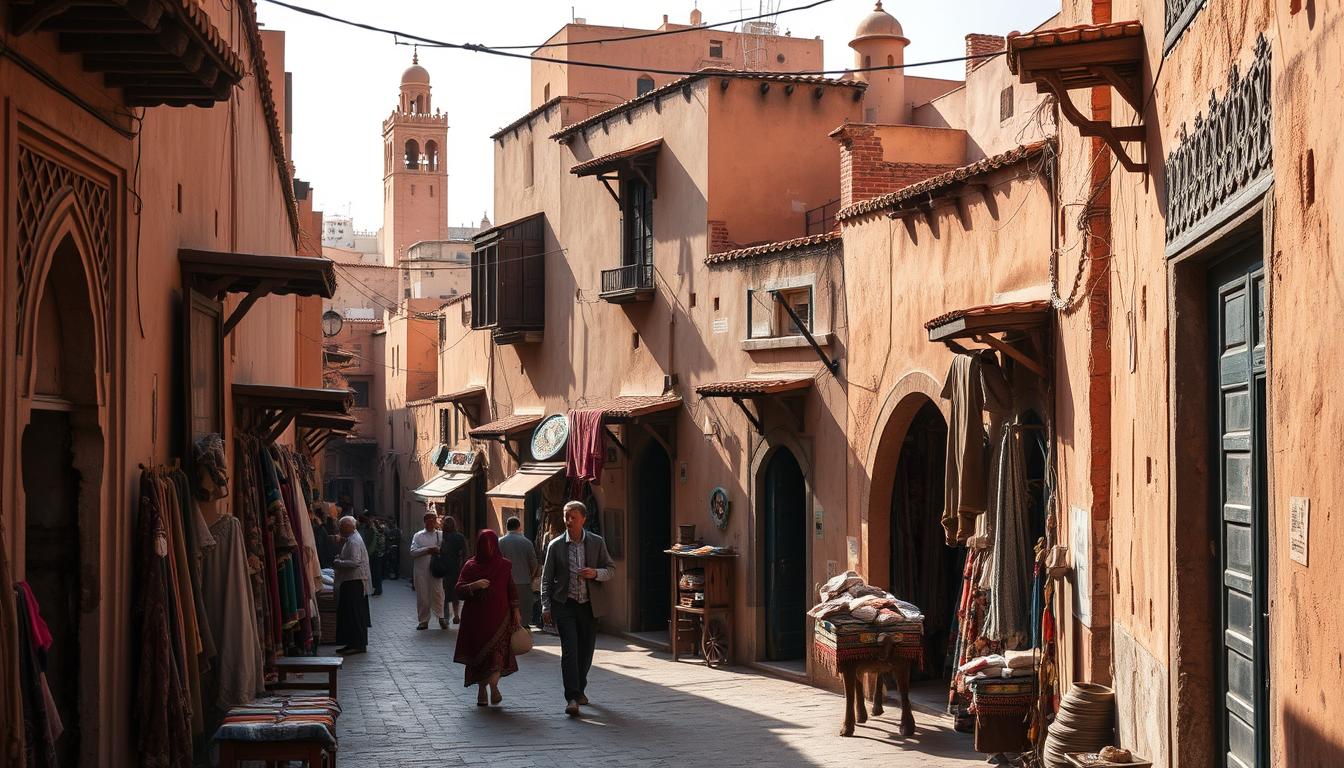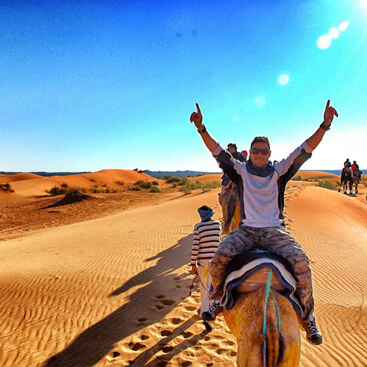
Explore the Best Time to Visit Morocco
Morocco Travel Seasons - a vivid exploration of the alluring landscapes, vibrant culture, and diverse experiences that make this North African gem a year-round destination. In the foreground, a desert caravan winding through golden dunes, camels silhouetted against a warm, sunset sky. In the middle ground, bustling souks in Marrakech, shopkeepers and artisans showcasing their wares under the shade of ornate, tiled archways. The background features the snow-capped peaks of the Atlas Mountains, their rugged beauty a testament to Morocco's diverse geography. Soft, diffused lighting casts a golden glow, evoking the timeless charm of this enchanting country. Capture the essence of Morocco's enchanting travel seasons, from the vibrant spring blooms to the crisp, invigorating winters.
When I first arrived in Morocco, I realized timing was key. Picking the right time to visit can turn a regular trip into an amazing adventure. Knowing Morocco's climate and seasons is crucial for your journey.
Morocco has something special for every traveler. You might want to explore lively medinas, hike the Atlas Mountains, or see the Sahara dunes. Choosing the best time for your trip can greatly enhance your experience.
Every season in Morocco has its own beauty and challenges. The best time to visit Morocco changes based on where you go and what you want to do. From the coast to the desert, Morocco's weather varies, giving you many chances to see its culture.
Key Takeaways
- Understand Morocco's diverse regional climates before planning
- Consider seasonal variations for optimal travel experience
- Balance weather conditions with cultural events
- Research peak and off-peak travel seasons
- Prepare for temperature differences across regions
Understanding Morocco's Climate and Seasonal Patterns
Planning a trip to Morocco? Knowing the country's climate is key. Morocco's geography leads to varied weather patterns, affecting your travel. From the coast to the desert, your trip will differ by region.
Morocco Climate Zones
A vast panoramic view of Morocco's diverse climate zones, captured through a wide-angle lens. In the foreground, the arid, golden Saharan dunes give way to the lush, verdant Atlas Mountains, their snow-capped peaks rising majestically in the distance. Transitioning across the middle ground, the landscape shifts to rugged, ochre-hued canyons and rolling, shrub-dotted hills. The background fades into a hazy, azure sky, bathed in warm, diffused sunlight that casts a golden glow over the entire scene. The overall composition conveys the striking contrasts and remarkable diversity that define Morocco's captivating climate and seasonal patterns.
Temperatures in Morocco change a lot by area. It's important to check the seasonal guide before you go. The country's shape creates different climates, offering unique experiences.
Mediterranean Climate in Northern Regions
Northern Morocco has a Mediterranean climate. It has mild, wet winters and warm, dry summers. Cities like Tangier and Casablanca have:
- Moderate temperatures from 50°F to 80°F
- Winter rain from November to March
- Perfect summer weather for the coast
Desert Climate in Southern Areas
Southern Morocco is very different, with extreme temperatures. The Sahara region has:
- Daytime temperatures over 100°F
- Nighttime drops in temperature
- Little rain all year
Atlas Mountains Weather Variations
The Atlas Mountains have their own climate. Height affects temperature and rain, with:
- Cooler temperatures at higher altitudes
- Possible snow in winter
- Big temperature changes between day and night
Knowing these climate zones helps pick the best time for your Morocco trip. It also prepares you for your adventure.
Best Time to Visit Morocco: Season by Season
Planning your trip to Morocco is exciting, with each season offering unique experiences. Knowing the peak season and the best months to visit helps you plan the perfect trip.
Morocco's diverse landscape means weather changes a lot across different areas. Your timing greatly affects your travel experience. Choosing the right season is key for an unforgettable trip.
Spring Splendor (March to May)
Spring is one of the best times to visit Morocco. You'll find:
- Mild temperatures perfect for exploring cities
- Vibrant wildflower blooms in rural landscapes
- Comfortable hiking conditions in the Atlas Mountains
Autumn Adventures (September to November)
Fall is another great time to visit Morocco. Travelers can enjoy:
- Moderate temperatures across most regions
- Fewer tourist crowds
- Harvest festivals in agricultural regions
Winter Wonders (December to February)
Winter offers unique travel opportunities, especially for adventure seekers. Highlights include:
- Snow-capped Atlas Mountains
- Mild temperatures in southern desert regions
- Lower accommodation prices
Summer Exploration (June to August)
Summer demands careful planning for comfortable travel. Consider:
- Coastal areas for cooler temperatures
- Early morning or evening outdoor activities
- Mountain retreats to escape intense heat
Each season in Morocco offers unique experiences. Travelers can find their perfect moment to explore this captivating destination.
Planning Your Trip Around Cultural Events and Festivals
When planning your trip to Morocco, look at the country's lively cultural calendar. The morocco seasonal guide shows a variety of festivals that can make your trip unforgettable.
Morocco's travel seasons are great for diving into local traditions. Key cultural events can really make your trip better:
- Ramadan: A spiritual month with unique cultural experiences
- Fes Festival of World Sacred Music in June
- Marrakech International Film Festival in November
- Eid al-Fitr celebrations
During these busy times, you'll see amazing cultural shows. Traditional music, dance, and religious events give you a real look at Moroccan life.
"Traveling during festivals allows you to experience the heart and soul of Morocco beyond typical tourist experiences."
Remember, the weather in Morocco changes during festivals. Some events might change business hours and where you can stay. Plan early to enjoy the culture and good weather.
Your morocco travel seasons plan should mix cultural events, weather, and what you like. Each festival is a special way to see Morocco's history and modern creativity.
Making the Most of Peak and Off-Peak Seasons
Traveling to Morocco needs smart planning to enjoy your trip fully. Knowing when to go can make your visit unforgettable. Morocco is a diverse and lively place.
Choosing the right time to visit Morocco means thinking about the weather, crowds, and special activities. Traveling off-season can change your trip for the better.
Peak Season Travel Tips
When it's busy in Morocco, the place is full of life. Here are tips to enjoy your visit:
- Book your stay and tours early
- Get to famous spots early to skip the lines
- Wear light, airy clothes to stay cool
- Drink lots of water and take breaks from the sun
Benefits of Off-Season Travel
Visiting Morocco when it's less crowded can be special. The rain can even help you save money:
- Accommodation prices are lower
- You'll meet more locals
- Popular spots are less crowded
- You can enjoy local events more closely
Shoulder Season Sweet Spots
The shoulder seasons are great for those who want the best of both worlds. These times offer nice weather and fewer people. It's perfect for seeing Morocco's holiday celebrations and enjoying a calm trip.
Choosing the right time to visit Morocco can make your trip unforgettable. It lets you tailor your adventure to your liking.
Conclusion
Planning a trip to Morocco means knowing its climate and seasons. Each time of year brings something special. From festivals to landscapes, Morocco changes with the weather.
Choosing when to go is key. Look at the temperature by month and what you like. Morocco's climate guide helps avoid crowds. Whether you prefer spring's cool or autumn's warmth, pick the right time.
Your Moroccan adventure is waiting. You can explore cities or relax in the desert. Know the seasons, pack right, and stay open to change. Morocco's culture and people make it a great place for curious travelers.
With knowledge of seasons, events, and travel tips, you're set for an amazing trip. Be ready for surprises, explore freely, and let Morocco's magic happen.
FAQ
- What is the best time of year to visit Morocco? The best time to visit Morocco is in the spring (March to May) and fall (September to November). You'll enjoy mild weather, fewer crowds, and great conditions for exploring. Spring brings beautiful landscapes, while fall is perfect for outdoor activities.
- How does the climate vary across different regions of Morocco? Morocco's climate varies a lot. The north has mild weather with Mediterranean influences. The south is very hot, and the mountains are cooler with snow in winter. Each area has its own weather, affecting your trip.
- What should I know about traveling during summer in Morocco? Summer in Morocco is very hot, especially in Marrakech and the Sahara. Coastal areas and mountains are cooler. Stay hydrated, plan indoor activities, and wear light, breathable clothes.
- Are there any cultural events I should plan my trip around? Morocco has many cultural events. The Fes Festival of World Sacred Music is in June, and the Marrakech International Film Festival is in November. Ramadan and Eid al-Fitr are also important. These events offer unique experiences but might affect travel plans.
- What are the advantages of traveling during the off-season? Off-season travel (winter) has many benefits. Prices are lower, there are fewer tourists, and you get a more authentic experience. You can see snow in the mountains or enjoy mild desert weather. But, be ready for cooler temperatures and limited services.
- What should I pack for different seasons in Morocco? Packing changes with the season. For spring and fall, bring layers and light jackets. In summer, wear light, breathable clothes and sun protection. For winter, pack warm clothes, especially for mountains and deserts. Always dress modestly to respect local culture.
- How does Ramadan affect travel in Morocco? Ramadan changes business hours and some restaurants close during the day. It's a unique experience but can be challenging. Some places stay open, but eating in public is discouraged. Plan your trip outside Ramadan or adapt to local customs.
- What are the cheapest months to visit Morocco? The cheapest months are late fall (November) and winter (December to February). Prices are lower, and there are fewer tourists. But, be prepared for cooler weather and limited services in some areas.
Related Tours

Marrakech to zagora 2 days
It is a long established fact that a reader will be distracted by the readable content
Read More2 Days
Marrakech to zagora

Marrakech to fes desert tours 2 days
It is a long established fact that a reader will be distracted by the readable content
Read More2 days
Marrakech to fes desert tours

Casablanca desert tours 8 days
It is a long established fact that a reader will be distracted by the readable content
Read More